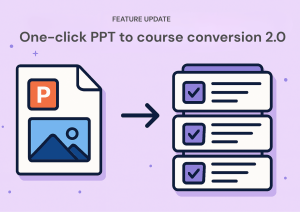
LMS – What is it? MEGA Guide to Learning Management System
- Author: Urban Rotar
- Published:

What is the benefit of using a cloud-based LMS?
Cloud-based LMS offers scalability and easy access from any location, reducing the need for heavy initial investments and ongoing maintenance.
How does SCORM affect my choice of an LMS?
SCORM compliance ensures that your e-learning content works smoothly across different LMS, making it essential for content interoperability and reusability.
Why should my organization consider creating custom certifications in our LMS?
Custom certifications directly tie learning outcomes to organizational goals, enhancing employee motivation and validating skill acquisition effectively.
Key Takeaways - LMS:
An LMS organizes, delivers, and tracks educational content, enhancing learning efficiency in schools and workplaces.
Cloud-based, open-source, and self-hosted are the main types of LMS, each offering unique benefits and suitable for different organizational needs.
Integrating an LMS with existing systems boosts productivity by automating administrative tasks and streamlining learning processes.
SCORM compliance is crucial for ensuring that e-learning content and LMS can operate across various platforms seamlessly.
Custom certifications within an LMS can motivate learners by recognizing their skills and encouraging practical application of their knowledge.
Introduction to Learning Management Systems
Welcome to our in-depth exploration of Learning Management Systems (LMS). Whether you’re a business leader, a training manager, or someone involved in educational technology, an understanding of learning management system will significantly enhance how your organization approaches learning and development. These platforms are not just technological solutions but transformative tools that reshape how knowledge is imparted, managed, and retained within professional and academic environments. Learning Management Systems are foundational to promoting continuous learning and supporting the educational goals of individuals and institutions alike.

Definition of a Learning Management System (LMS)
A Learning Management System (LMS) is, at its core, a sophisticated software application or web-based technology designed to support and streamline the educational process. This system acts as a dynamic framework enabling the administration, documentation, tracking, reporting, and delivery of educational courses or training programs. By leveraging learning management system, educators and corporate trainers can deliver materials to participants, administer tests, track progress, and manage records from a centralized platform, thereby simplifying the learning process and enhancing the learning experience.
Brief History and Evolution of LMS
Tracing the lineage of Learning Management Systems takes us back to the early 1990s. Initially conceived as computer-managed learning systems and courseware, LMS have evolved dramatically over the years. From their rudimentary forms as tools for distributing online courses, to sophisticated platforms capable of integrating with a range of educational and corporate technologies, LMSs have expanded in functionality and complexity. This evolution reflects broader trends in technology and education, including the rise of the internet, the proliferation of mobile learning devices, and the increasing importance of continuous professional development in the global economy.

Understanding Learning Management Systems
Learning Management Systems (LMS) provide a structured environment where organizations can manage all aspects of learning and training. Whether it’s deploying online courses, tracking learner progress, or managing online training, learning management system simplifies these processes through a central platform. This enables educational institutions and businesses to deliver learning content efficiently and measure the effectiveness of their programs in real-time.
How Do Learning Management Systems Work?
The operation of Learning Management Systems revolves around creating a structured, accessible, and scalable environment for learning. LMSs enable educators and trainers to assemble and deliver content, monitor learner participation, and assess learner performance. These platforms can support a wide range of multimedia including videos, slides, and interactive content, making them highly adaptable to different learning styles. Furthermore, the ability to integrate social learning, forums, and feedback mechanisms within an LMS enriches the learning experience, fostering greater engagement and collaboration among learners.
Key Features and Tools
At the heart of every learning management system are its features and tools that make it a powerful learning aid. These include course management capabilities, real-time feedback systems, and performance tracking analytics. Advanced features might also include gamification, where elements of game playing (e.g., point scoring, competition with others) are applied to increase engagement and enhance the learning process. Moreover, LMSs typically offer tools for creating detailed reports that help instructors understand the effectiveness of their content and strategies.
Integrations and Compatibility
To maximize efficiency and impact, LMSs are designed to seamlessly integrate with various software systems that organizations already use. This might include direct links to HR systems for tracking employee training, integration with third-party tools like webinar software, or compatibility with enterprise resource planning (ERP) systems. These integrations help ensure that the LMS operates not in isolation but as part of a cohesive technology strategy, enhancing the overall infrastructure of the organization and ensuring a smoother workflow across departments.
Benefits of Using a Learning Management System
The adoption of an LMS offers a multitude of benefits for any organization. From streamlining the delivery of training programs to improving the management systems for learning, an LMS enhances educational outcomes and operational efficiency. Key advantages include centralized training materials, scalability of learning resources, and detailed analytics on learner engagement and performance.
For Employers: Increased Productivity and Efficiency
For employers, the adoption of an LMS translates into tangible gains in productivity and operational efficiency. By automating administrative tasks such as registration, attendance tracking, and grading, an LMS frees up trainers and HR professionals to focus on more strategic tasks. These systems also facilitate the rapid deployment of training materials across geographically dispersed teams, ensuring that all employees receive the training they need in a timely manner, irrespective of their location.
For Employees: Personalized Learning and Development
Employees stand to gain significantly from the implementation of an LMS. These systems enable personalized learning paths, allowing individuals to learn at their own pace and according to their own learning style. This personalized approach is not just about convenience; it’s about respecting individual learner needs and providing a platform for more effective personal development. Through an LMS, employees can access a wide array of training modules, interactive sessions, and professional courses that contribute to their career growth and skill development.

For Organizations: Scalability and Cost-Effectiveness
From a strategic perspective, LMSs offer scalability and cost-effectiveness that is crucial for organizational growth. Whether scaling up with the growth of the company or adapting to reduced training budgets, learning management system provides a flexible and economical solution for comprehensive training programs. The digital nature of LMS reduces the need for physical training materials and onsite training sessions, cutting down significant costs associated with traditional training methods and allowing the funds to be redirected towards other critical areas of development.
Types of Learning Management Systems
There are several types of LMS available, each suited to different organizational needs and scenarios. Cloud-based LMSs are popular for their flexibility and lower upfront costs, open-source LMSs offer high customizability, and self-hosted solutions give organizations complete control over their data and security. Understanding the specific benefits of each type can help in selecting the right LMS for your needs.

Cloud-Based Learning Management Systems
There are several types of LMS available, each suited to different organizational needs and scenarios. Cloud-based LMSs are popular for their flexibility and lower upfront costs, open-source LMSs offer high customizability, and self-hosted solutions give organizations complete control over their data and security. Understanding the specific benefits of each type can help in selecting the right LMS for your needs.
Open-Source Learning Management Systems
Open-source LMS platforms are preferred by organizations looking for customizable solutions. These systems provide the source code, enabling IT departments to modify and tailor the platform to the specific needs of the organization. While this can offer unmatched flexibility, it also requires a significant investment in terms of time and technical expertise to ensure the system is properly configured, maintained, and secured. Open-source LMSs are ideal for organizations with unique workflows or those who require extensive integration with existing systems.
Self-Hosted Learning Management Systems
Self-hosted LMS solutions are installed on the organization’s own servers. This model offers the highest level of control over the LMS infrastructure, data, and security. Organizations that choose self-hosted LMSs often have strict data privacy requirements or specific customization needs that cloud-based or open-source solutions cannot fulfill. However, this type of learning management system involves higher upfront costs, including the maintenance of servers and IT staff to manage and update the system.
Payment Options for Learning Management Systems
LMS payment options vary widely, accommodating a range of organizational sizes and budgets. Organizations can choose from subscription-based models, which are common with cloud-based LMSs, one-time license fees typical of self-hosted platforms, or even free versions that offer basic functionalities. Each payment model comes with its own set of features, scalability options, and support levels to fit different training needs and financial capabilities.

Free and Open-Source Learning Management Systems
For organizations with limited budgets, free and open-source learning management system solutions provide an essential service without the financial burden. These platforms, while generally offering basic functionalities, can be a great starting point for small businesses or educational institutions that are initiating their e-learning strategies. They allow organizations to experiment with digital learning without a significant investment and can be scaled or upgraded to more robust systems as needs evolve.
Enterprise Learning Management System Pricing Models
Enterprise LMS solutions are typically offered through various pricing models tailored to large organizations’ complex needs. These models might include per-user pricing, a flat monthly or annual fee, or pay-as-you-go options, providing flexibility in how organizations budget for their learning needs. Enterprise systems come with extensive support, a wide range of features, and scalability options, making them suitable for large organizations looking to implement comprehensive and detailed training programs.
Customized Learning Management System Solutions
Custom LMS solutions cater to organizations that need a system tailored to their specific processes and goals. These systems are typically developed by vendors who work closely with the client to build a solution that integrates seamlessly with their existing workflows and technology stack. While this option can be more costly, it ensures that the LMS perfectly aligns with the organization’s requirements and offers a unique user experience designed specifically for its learners.

Implementing a Learning Management System
Implementing an LMS requires careful planning and execution to ensure success. It involves evaluating different systems to find one that meets your learning and training needs, preparing your infrastructure for integration, and training staff and educators to use the system effectively. Proper implementation ensures that organizations can fully leverage their learning management system to enhance their educational offerings and streamline their training processes.
Criteria for Evaluating Learning Management System Options
When selecting an LMS, organizations must consider a variety of factors to ensure the system meets their needs. Key evaluation criteria include the system’s scalability, compatibility with existing systems, ease of use, technical support offered by the provider, and specific features that support the organization’s learning and training goals. It’s important to choose an LMS that not only fits the current needs but also has the potential to grow with the organization.
Tips for Implementation and Integration
Effective LMS implementation requires a strategic approach. Start by involving all key stakeholders in the planning process to ensure the system meets the needs of all parts of the organization. It’s crucial to have a detailed implementation plan that includes timelines, training for users, and a clear communication strategy to ensure a smooth transition. Regularly soliciting feedback from users can also help identify issues early and ensure the system is being used to its full potential.

Common Mistakes to Avoid
One of the most frequent pitfalls in LMS implementation is underestimating the importance of user training and ongoing support. Another common error is failing to fully integrate the LMS with other technology tools used by the organization, which can limit the effectiveness of both the LMS and other systems. It’s also important to avoid choosing a learning management system based solely on cost without considering whether it meets all the functional requirements needed to support effective learning and development.
Learning Management System vs. Learning Experience Platform
While both LMS and Learning Experience Platforms (LXP) aim to facilitate educational processes, they cater to different aspects of learning. Learning management system is typically focused on the administrative side of education, helping organizations deliver courses and track compliance. An LXP, on the other hand, provides a more dynamic and personalized learning experience, emphasizing social learning, personal development, and content curation.
Key Differences and Similarities
Learning Management Systems (LMS) and Learning Experience Platforms (LXP) both serve to facilitate learning, but their approaches and focuses differ significantly. LMSs are primarily designed to manage, deliver, and track workplace or educational learning. They often have a structured environment that administrators control. LXPs, on the other hand, are newer and focus on the user experience, offering more flexible learning opportunities that allow learners to take control of their own development paths. LXPs support informal learning that includes social learning, content curation, and personalized learning paths. While there is some overlap in functionality, the choice between an LMS and an LXP depends largely on the organization’s specific learning goals and the level of autonomy they wish to provide to their learners.
Choosing the Right Platform for Your Needs
Selecting the right platform—whether an LMS or an LXP—depends on several factors including organizational learning culture, specific training needs, and the desired level of engagement. For companies focusing on formal, compliance-driven training, learning management system might be the better option. However, for organizations looking to foster a culture of continuous learning and collaboration, an LXP could be more appropriate. It’s crucial to assess not only the technical features but also how well the platform aligns with the organization’s long-term learning and development strategies.

Advanced Topics in Learning Management Systems
Advanced topics in the realm of LMS include understanding the technical standards such as SCORM for content interoperability, exploring the differences between LCMS and LMS, and integrating emerging technologies like AI to personalize learning experiences. These advanced concepts are crucial for organizations looking to leverage their learning management system for maximum impact and to ensure they remain competitive in the rapidly evolving landscape of digital education.
What is SCORM and Its Role in LMS?
SCORM (Sharable Content Object Reference Model) is a set of technical standards for e-learning software. It defines how online learning content and Learning Management Systems communicate with each other. SCORM compliance is critical because it ensures interoperability between different e-learning software and platforms. This means that SCORM-compliant content can be easily shared across different systems, making it a universal standard for tracking user progress and performance. Understanding SCORM is essential for anyone involved in developing or managing e-learning content, as it affects content creation, course delivery, and learner assessments.
LCMS vs. LMS: Understanding the Difference
The distinction between a Learning Content Management System (LCMS) and an LMS is often confusing. An LCMS focuses more on the management of content creation and provides tools for developing, managing, and publishing learning content. In contrast, an LMS primarily manages the delivery of that content to learners and tracks their progress. While there’s overlap in functionality, the primary focus of an LCMS is content development, making it ideal for organizations that frequently update or customize their training materials.
Talent Management System (TMS) vs LMS
Talent Management Systems (TMS) and Learning Management Systems (LMS) serve different, although occasionally overlapping, organizational functions. A TMS typically encompasses a broader range of HR functions, including recruiting, performance management, and employee development, aimed at nurturing and retaining talent. Learning management system, by contrast, specifically targets the learning aspect, focusing on developing employee skills and knowledge. Organizations often integrate both systems to ensure a cohesive approach to talent development and learning.
Conclusion – LMS
Is a Learning Management System Right for Your Business?
Deciding whether an LMS is the right tool for your organization depends on multiple factors, including your training needs, the size and distribution of your workforce, and your budget constraints. An LMS can be a powerful tool for organizations looking to streamline their training processes and improve learning outcomes. However, it requires a strategic approach to ensure alignment with business goals and learner needs.
Creating Your Own Certifications for Your LMS
Incorporating certifications into your LMS can add value to your training programs by providing learners with tangible recognition of their skills. Developing in-house certifications tailored to specific skills or competencies can motivate employees, reinforce the application of learning, and help track the effectiveness of training programs. Custom certifications can also serve as a benchmark for employee performance and progression, supporting both personal development and organizational goals.



